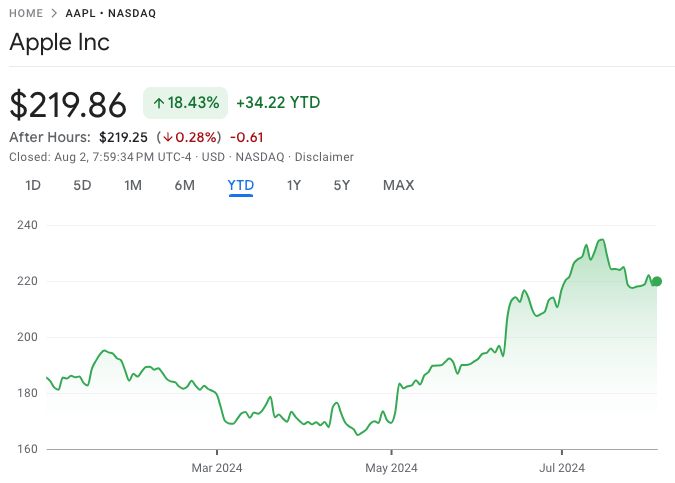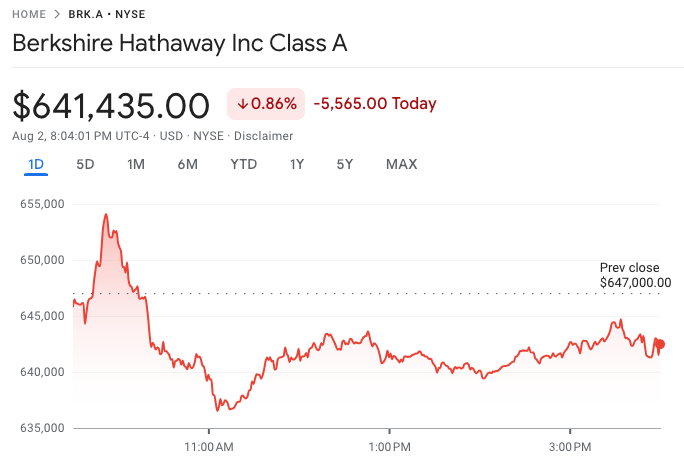According to a report by Yun Li for CNBC, according to Berkshire Hathaway’s Q2 2024 earnings report, the American multinational conglomerate holding company made a surprising move by significantly reducing its substantial stake in Apple during the second quarter of this year. The 185-year-old firm sold slightly over 49% of its holdings in the tech giant, a notable action given Buffett’s long-term investment strategy. Despite this reduction, Apple remains Berkshire’s largest stock holding. This divestment trend is part of a broader strategy, with Berkshire selling more than $75 billion in equities in the second quarter, boosting its cash reserves to an unprecedented $277 billion.
Previously, Buffett reduced the Apple stake by 13% in the first quarter. On May 4, Berkshire Hathaway held its 2024 Berkshire Hathaway Annual Shareholders Meeting. Warren Buffett, the firm’s chairman and CEO, provided insights into the company’s decision to reduce its stake in Apple, their largest holding.
Buffett began by reaffirming Berkshire Hathaway’s fundamental investment philosophy, which is to treat stocks as ownership stakes in businesses rather than as mere trading commodities. This approach, influenced by Benjamin Graham’s teachings in “The Intelligent Investor,” emphasizes the importance of understanding and valuing businesses over market speculation.
Buffett was clear that the decision to reduce the Apple stake was not a reflection of a change in their view of Apple’s business quality. In fact, he reiterated that Apple remains an exceptionally strong and valuable business, comparable to other long-term holdings like Coca-Cola and American Express.
The primary reason for reducing Apple’s holding, according to Buffett, lies in Berkshire Hathaway’s approach to capital allocation. He explained that while they view Apple as a business they want to continue owning, it’s also prudent for Berkshire to occasionally realize gains from its investments, especially in a favorable tax environment.
Buffett emphasized the role of tax considerations in their decision-making. Berkshire Hathaway sold shares at a time when the federal capital gains tax rate was 21%, which is historically low compared to previous rates that have been as high as 52%. Given the current fiscal policies and the potential for future tax increases, Buffett suggested that it makes sense to take some profits now rather than risk higher tax rates in the future.
Another factor influencing the sale was the attractiveness of maintaining a strong cash position. Buffett mentioned that despite the strong fundamentals of Apple, the current market conditions and global economic environment make holding cash a strategically sound decision. This cash can be used for future investments or opportunities that may arise.
Buffett also addressed Berkshire Hathaway’s philosophy on paying taxes. He underscored that Berkshire does not avoid paying taxes and views their tax contributions as appropriate and necessary given the benefits and opportunities the country has afforded the company and its shareholders. Last year, Berkshire paid over $5 billion in federal taxes, and Buffett expressed no concern about continuing to make significant tax contributions in the future.
Despite the reduction, Buffett assured shareholders that Apple would remain a substantial part of Berkshire Hathaway’s portfolio. The company intends to hold onto its major investments in Apple, Coca-Cola, and American Express, unless something extraordinary changes their capital allocation strategy.
However, the scale of this recent sell-off suggests additional factors at play beyond tax considerations. The timing coincides with a significant rally in Apple’s stock price, which surged by 23% in the second quarter following a decline in the first quarter due to AI innovation concerns. This surge happened as Apple provided more details about its AI strategy.

Several potential reasons could explain this decision:
- High Valuation Concerns: Apple’s stock has appreciated significantly, leading to a high market valuation. Investors, including Berkshire, might see this as an opportune moment to realize gains.
- Diversification and Risk Management: Apple heavily relies on the iPhone for over half of its revenue, exposing the company to market fluctuations and changing consumer preferences. Reducing exposure to mitigate these risks can be a prudent strategy.
- Market and Geopolitical Risks: Apple faces intense competition and geopolitical tensions, particularly between the U.S. and China, which could impact its operations and market share.
- Regulatory and Legal Challenges: Apple is under scrutiny for regulatory and legal issues, such as accusations of unfair business practices and user privacy concerns. These challenges can affect investor sentiment.
- Profit-Taking Strategy: Increasing cash reserves suggests a strategic move to enhance liquidity, preparing for future investments or economic uncertainties.
- Evolving Business Landscape: Apple is expanding into new areas like video content streaming and financial services, facing stiff competition. These ventures present execution risks and uncertainties.
While Apple remains a highly profitable company with a strong financial performance and a robust ecosystem, these potential weaknesses and external pressures provide context for Berkshire Hathaway’s decision to reduce its stake. Despite selling a substantial portion, Apple continues to be a significant part of Berkshire’s portfolio, reflecting ongoing confidence in the company’s long-term prospects.
This decision is part of a broader pattern of Buffett downsizing his top holdings, including recent reductions in Bank of America shares. The selling spree occurred during a quarter when the S&P 500 reached record highs, driven by expectations of a “soft landing” for the U.S. economy.
Berkshire Hathaway stock (class A shares) closed at $641,435.00 on Friday, down 0.86% on the day.

Featured Image via Pixabay









